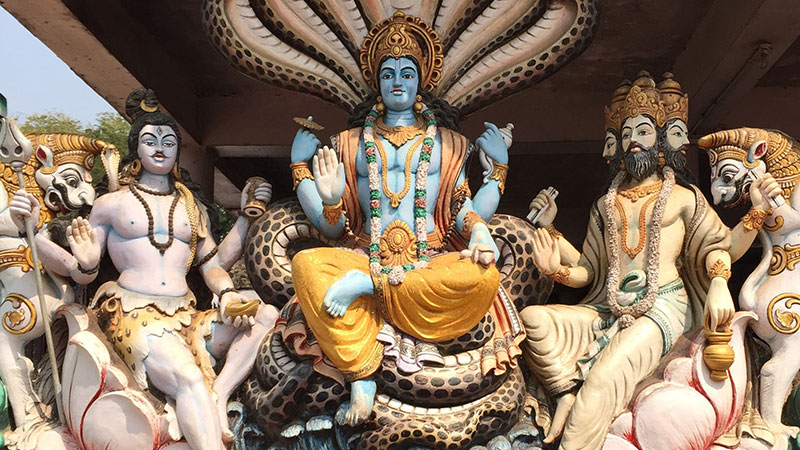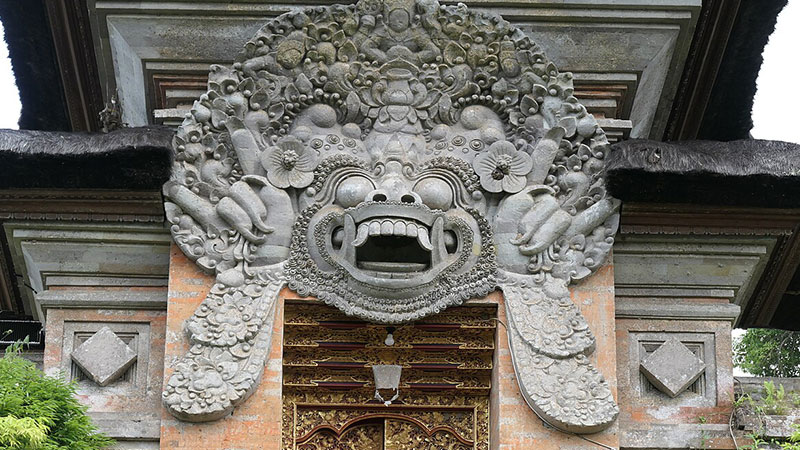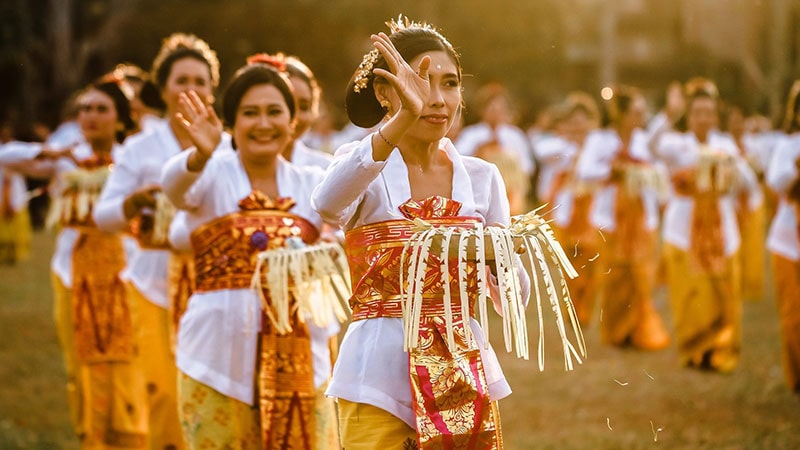Bali Hindus see life as a set of births and deaths, each characterized by important rituals and linked to the daily lives of the people of this land. The purpose of believing in these traditions is to maintain the balance between good and evil. Bali Hinduism, with its rich traditions and traditions, instills a sense of peace and mystical to the island. This ritual has even infiltrated the art of Bali, which is closely linked to Hindu myths, and is often exhibited at religious and festivals. Continue on us and get acquainted with the religious rituals and occasions of this country.
Bali Culture: Religion
The main religion in Bali is Hinduism, which is quite different from the Hindu religion in India. In this country, religion is closer to what we can call “life”: believing that everything has the soul in nature. That is why in Bali culture, people are very careful about nature and respect nature, because they believe that everything has a god in which they live. More interestingly, Bali religious rituals are always accompanied by celebration: rural festivals, pilgrimage, dances, purification ceremonies as well as burning wood and recurrence in honor of the dead and all of the Bali celebration calendars and part of the rich culture. They are the country. If you are lucky, you can see one of these beautiful and mystical rituals on the Bali Tour.

The gods in the Bali culture
Bali is known all over the world as the island of the gods. Below Bali Religious Rituals will tell you why the island is known as this name:
The main god in the religious rituals of Bali
In Bali’s culture and religion, there are many different gods, the three main gods of which are Brahma, Shiva and Vishnu. Diva is the god of knowledge that is often painted in Bali temples. Vishnu is a kind guardian of life. He pushes the cycle of life with his wife Goddess. On the other hand, the life cycle of the “Shiva” is the god of death and destruction. Of course, this does not mean the complete destruction of life. In fact, in Bali culture, death means cleaning and returning to life. This cycle, along with karma, which rotates based on good or bad deeds and is balanced, is very important in Bali religious religions.

A few secondary gods in the religious rituals of Bali
In Bali culture, you will also find other beloved gods such as the famous Eagle of Garoda, which the Indonesian Airlines has named. Bali tourists are easily known by the sharp beak of teeth, large and magnificent wings and often by Diva Vishnu. Another face that will soon be familiar to all Bali tourists in any temple is Bhoma. This God protects the entrance of all temples in Bali or even the doors of personal homes. It is hard to say whether this big face smiles at Bali tourists with an open mouth or stared at them with a monster look!

Read more: Where is Bali | In which country is Bali?
The importance of gifts in Bali religious rituals
One of the main ways to respect the gods in religious rituals is to give them gifts. So you will find the incredible number of temples in Bali. Temples on the island are not necessarily large places that can host the public, they can be built in small sizes in a personal home or garden. In fact, the temple in Bali has to protect its people and protect the land. Even if you stay in a hotel, it is important to satisfy and respect the gods so that guests can enjoy their stay without worry.
People give gifts to the temples to feed the gods. Gifts are a small basket of palm leaves in a tray called “Kanang Sari” and contains colorful items including fruits, flowers, leaves and nuts. In Bali culture, every element has a symbolic semantic.

Read more: Introducing the Bali Gallonkan Festival
The most important religious rituals and rituals in Bali
As mentioned in the previous paragraphs, Bali culture is very rich, and the calendar of the people of this land is filled with a lot of celebrations and ceremonies. Some of the ceremonies are purely local and some are celebrated throughout the island.
Bali occasions: Nayyer Day (Nyepi Day)
In Bali culture, it is the day of the “Silence Day” celebrated every year in March. This day is equivalent to the New Year for the Bali Lunar Calendar and is also one of Indonesia’s official holidays. On the day of the Nipp, all activities and jobs are closed, the lights are off, and by law no one has the right to go out on the streets. That day is the day of cultivation of the soul. The day before the Nipp, large gifts are placed on each street crossing, and the parade of “Ago-Ago” from the Devils in Bali culture with music throughout the villages will be burned with sunset to cultivate the souls of the inhabitants.

Bali occasions: Galongan and Connectan (Galungan and Kuningan)
In Bali, a ten -day religious celebration, Galungan, is celebrated twice a year. Galungan is a celebration of the creation of the world and the victory of good against evil. According to Bali culture on this day, the ghosts of the ancestors return to their previous temples and homes, so that the Bali people are doing their best to welcome them through prayer and vow. Tourists of the Bali Tour can identify the festival with signs such as long, bamboo wooden woods on both sides of the street. The last day of Koningan is when the ancestors leave the earth to the next Galongan.

Ballian cultural ceremonies: Pigiqui (Pagewesi)
Pagewesi is in the religious rituals of Bali when people devote their day to defending themselves against evil spirits. In fact, this day belongs to the strengthening of the soul against the soul as well as prayer for the rest of humanity. The name “Pagori” literally means “iron fence”, which is a symbol of the strong strength of the mind against malicious forces. The ritual is celebrated a few days after Saravati.

Bali Cultural Ceremony: Saravati (Saaraswati)
Saravati is the day dedicated to David Saravati, Goddess Danesh. On this day, Saravati gives divine inspiration to the people of Bali and enables them to celebrate Pagori and build a fence to protect your mind and soul.

Bali occasions: Odalan (Odalan)
Odalan celebrates the anniversary of the temples in Bali. The people of Bali decorate their temple with magnificent gifts to respect the gods and celebrate this day with music. Despite several thousand temples in Bali, tourists have a great chance of watching the temple celebration during their stay.

Bali Cultural Ceremony: Tumps (Tumpek)
There are several Tumps festivals in Bali culture throughout the year. Each of them respects the gods by presenting special objects. “Tumpek Landep” is the day of commemoration of all metal tools such as iron, gold or bronze. This day is celebrated to thank God for the blessings of the gods. Tumpek Uduh celebrates the god of plants and foods. On this day, the people of Bali will appreciate their appreciation and give gifts from trees, plants, coconuts, etc. to thank God for harvesting. The Tump Kandang is another religious religion that will respect the god of animals and pets. On that day, pets and farms such as ducks, pigs, chickens and dogs are decorated in some homes.

Final speech
Religious rituals in Bali present a manifestation of tradition, religion and culture. The ceremony is not only important for Bali Hindus, but also affects tourists and fascinates their mystical atmosphere. We suggest that if you are planning to travel to Bali, coordinate the history of your trip with one of this traditional and religious event.
Frequently asked questions
Which religion of Bali is related to?
Most of the religious rituals in Bali relate to Hinduism that combined with the island’s local culture and have become part of the tourist attractions in the region.
Are tourists allowing Bali to attend religious ceremonies?
Yes, tourists can attend many religious ceremonies with respect to local laws and practices such as proper coverage and respectful behavior.
What are the most important religious rituals in Bali?
One of the most important religious ceremonies at the Bali is the Galungan Festival and Nyepi or the Day of Silence, which is of particular importance in the religious calendar of Bali.
Copying the contents of the Vanak Star Airlines agency is solely with the source.
RCO NEWS

















